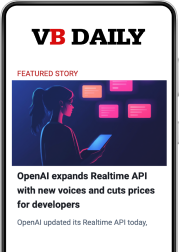
Join the event trusted by enterprise leaders for nearly two decades. VB Transform brings together the people building real enterprise AI strategy. Learn more
Can enterprise teams truly vibe code their way out of expensive SaaS contracts? Replit CEO and co-founder Amjad Masad seems to think so, and the ambitious vision could mean “agents all the way down.”
Speaking at VB Transform on Tuesday, Masad touted how his startup’s agents could help a non-developer design and code a live polling app in a mere 15 minutes — using a written prompt to create databases, login authentication and even quality checks.
“This is sort of like an almost semi-autonomous agent,” Masad said. “You can watch it, you can also go get a coffee and it’ll send you a notification when it’s ready to show you the future.”
>>See all our Transform 2025 coverage here<<
Scaling apps, sites and software without coding
A polling app might not seem all that necessarily for most enterprise teams. However, the process illustrates how quickly some platforms are allowing individuals and teams to quickly and cheaply build and scale various websites, apps and software in ways that could potentially cut timelines or even replace some outside vendors — all without knowing much or any code.
The road map for Replit includes building more APIs and abstractions of primitives that agents can use to quickly set up databases, payment processes, and other features. Masad also mentioned other updates for Replit v3, including a way for users to add generative models directly to their app and have agents autonomously run tests of AI-generated apps.
In recent months, vibe coding has become increasingly popular to help non-developers quickly design and code a new website, app, or agent from scratch using natural language prompts. Giants like Anthropic and Google have rolled out new tools, while startups like Anywhere, Genspark, and Lovable have raised new funding. (Just last month, Windsurf was reportedly in talks to be acquired by OpenAI.)
Replit is finding new ways of integrating with various enterprise-grade platforms to boost AI development. In February, Anthropic revealed that Replit was helping companies build with Claude on Google’s Vertex AI to support more than 100,000 applications with security and scalability. The growth of agentic coding might impact the value of creating apps, which Masad predicts could decline significantly and “perhaps to zero at some point.”
When asked if his company could actually replace enterprise-grade tools like configure-price-quote (CPQ) systems, Masad said “we’re seeing customers have three orders of magnitude of savings on apps.” He gave an anecdote about a Replit user that claimed to use the platform to make a working version for ERP automation for just $400 instead of the vendor’s quoted $150,000.
“When you think about what the software does, a lot of Replit users wake up in the morning, they have a problem in their minds, and they create an app to solve that problem,” Masad said. “…The software agent will go and build software in order to solve that problem and we’ll solve that problem for you.
Vibe coding still requires proper human analysis
Despite the growing competition, Masad said some platforms like Claude Code and Cursor help novices, but he warned that AI-generated code without proper checks could lead to leaked data or API keys. Replit addresses that risk through its cloud-native design, sandboxing to test agents in an isolated environment, and finding and fixing various security vulnerabilities.
According to Masad, the point of differentiation is Replit’s full stack nature and focus on creating an autonomous software engineer. He thinks it might go beyond making an app to solve problems if there are ways to have agents skip the intermediate step.
Masad sees Replit and other generative AI features helping to generate UI changes based on the form factor of any given device. When a VB Transform audience member asked where the internet is heading with the future of web pages and multimodal agents, Masad said he thinks there’s a growing expectation of how the form factor of computing will change — which he noted could include various AI-enable wearables from OpenAI and Meta.
Junior engineers = SMEs?
Another aspect that came up was the future of how junior engineers will become subject matter experts. One audience member asked how people will learn for themselves instead of blindly accepting an agent’s code changes. Masad didn’t give a direct response but instead said the platform can highlight any piece of code and provide an explanation. He said that leads to a question about the vision for AI.
“I think we’re going to get to a point where you don’t have to interface with the code,” he said. “We’re going to be able to interact with software on a higher level of abstraction. We need something a little better than English — somewhere in between code and English — and maybe someone will build that.”
Replit has had renewed momentum since it laid off 30 staffers in May 2024 as part of an aggressive pivot. Now, a year later, Masad said the company has surpassed $100 million in ARR — up tenfold since the end of 2024. In a Tuesday interview with TBPN, he noted that people are using Replit to create multiple agents to help with a single project.
“The buzzword used to be the 10x engineer,” he said. “…You’re really just one person. You’re a team of engineers. I think every engineer is sort of a manager right now, so we’re not at 1,000x yet, but we’re going up.”





Be the first to comment